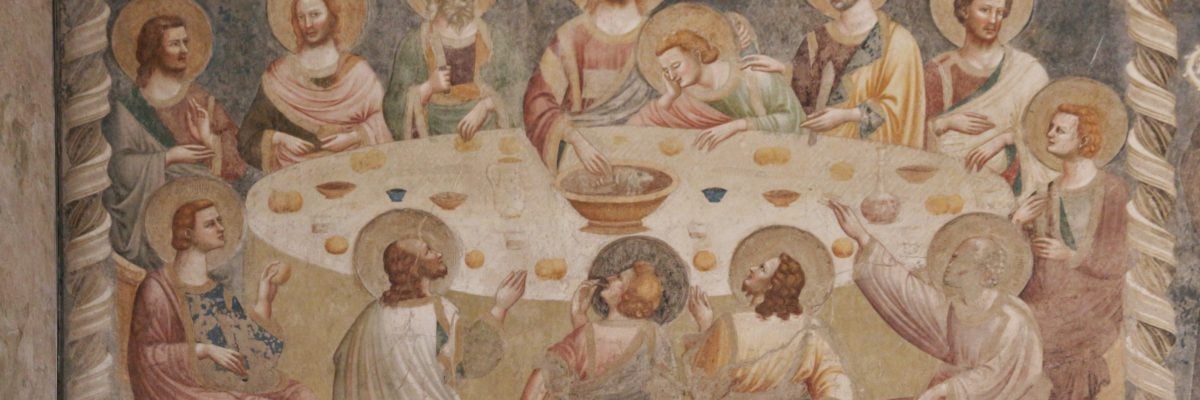
There are a great many intelligent Protestant Christians, well-versed in Scripture, faithfully seeking to know and follow the will of God, who have concluded that Jesus’ words about the bread and wine of the Last Supper becoming his body and blood are merely symbolic.
What if they’re right?
At first, it seems as though such a revelation would be a tragedy. Receiving the Eucharist is the most intimate encounter with Jesus Christ possible this side of eternity. Suddenly to discover that this intimacy was a sham, and that what we thought was God was actually just bread, would be disheartening, to put the matter mildly. Worse, it would mean that those hours spent in adoration were something approaching idolatry rather than proper worship of God.
But the true tragedy would be greater still—it would mean that the Church has been wrong about the Eucharist from the beginning. For the earliest Christians universally believed in the Real Presence of Jesus in the Eucharist. The well-respected early Church historian J.N.D. Kelly, a Protestant, has acknowledged that “Eucharistic teaching, it should be understood at the outset, was in general unquestioningly realist, i.e., the consecrated bread and wine were taken to be, and were treated and designated as, the Savior’s body and blood” (Early Christian Doctrines, 440).
Take, for example, the church at Smyrna, in modern-day Turkey. In the latter half of the first century, the apostle John had delivered a message directly from Jesus Christ to the Smyrnaeans, encouraging them in their faithfulness amid their sufferings (Rev. 2:8-11). Shortly thereafter, a student of John, St. Ignatius of Antioch, wrote to this same local church on his way to be martyred in Rome early in the second century.
In his letter, Ignatius warns the Smyrnaeans to “keep aloof from” the heretical Gnostics “because they confess not the Eucharist to be the flesh of our Savior Jesus Christ” (Epistle to the Smyrnaeans 7). Notice that Ignatius doesn’t feel the need to convince his readers of the truth of the Real Presence. For him, it’s enough to say that since the Gnostics reject the Real Presence, we should not even “speak of them either in private or in public.”
This is the way that Christians approached the Eucharist throughout the first few centuries of the Church. It was not just that a theologian here or there taught the Real Presence, but that it was the Christian position on the topic. In a series of lessons given to catechumens about to enter the Church, St. Cyril of Jerusalem reminded them that “you have been taught and you are firmly convinced that what looks and tastes like bread and wine is not bread and wine but the body and the blood of Christ” (Catechetical Lecture 22). Cyril is comfortable assuming that even those not yet baptized know enough about Christianity to realize that Christians believe in the Real Presence.
Even more telling than the many Church Fathers teaching and preaching on the real presence of Jesus in the Eucharist is the absence of Christian leaders either rejecting this Catholic position or teaching a contrary position.
If a Baptist pastor got up on Sunday and declared that the bread and wine become the body and blood of Christ, you could expect that there would be angry letters denouncing him as a heretic, or at least seeking to correct him. That’s because Baptists don’t believe in the Real Presence.
The fact that we don’t see this sort of outcry in the early Church is compelling evidence that the early Christians didn’t believe what modern Baptists do about the Eucharist. Rather, they were united in belief about the Real Presence at a time when Christians weren’t afraid to squabble with one another over relatively smaller matters.
Why is this important? Because it means that these Protestants are saying not just “I think Jesus’ words at the Last Supper are meant to be merely symbolic,” but “I think that the entire Church misunderstood one of the most basic aspects of Christianity for centuries.” Call this the “everybody got the gospel wrong” position.
At the Last Supper, Jesus said, “I will not leave you desolate” (John 14:18), a promise not to abandon the Church or to leave us as orphans. Specifically, Christ promised to preserve his Church by sending “the Spirit of Truth,” the Holy Spirit, to “teach you all things, and bring to your remembrance all that I have said to you” (John 14:17, 26). How is belief in this promise compatible with the idea that the whole Church lost the true meaning of the Last Supper, and that no Christians successfully followed his instructions to “do this in remembrance of me” (1 Cor. 11:24)?
To be sure, left to our own devices, you and I would get some aspects of the gospel wrong. That’s why there are so many competing Protestant denominations. But the solution to that is to turn to the Church and to have the humility to be guided, rather than trusting that our own reading of Scripture is superior to everyone else’s. This is the model laid out in Scripture itself. When Philip the Evangelist found an Ethiopian official reading the book of Isaiah, he asked him, “Do you understand what you are reading?” to which the man replied, “How can I, unless someone guides me?” (Acts 8:30-31). But the Protestant view undermines all of this by suggesting that the visible Church, and indeed all Christians everywhere, might be the ones in the wrong.
This is about not just rejecting the Church’s teaching authority, but rejecting all of Christianity prior to a certain point in history. If you can simply throw out all of (say) pre-1517 history as heretical and off the mark, why not throw out all pre-2018 Christianity? What appears on the surface to be a question simply about the Eucharist or the perpetual virginity of Mary is really a question about whether we can trust Christ’s promise not to abandon us, leaving us to our own private theological interpretations.
What’s more, if everybody got the gospel wrong then, what makes us think that anybody has the gospel right now? If we could all be wrong on the literality of the Eucharist for centuries, why couldn’t we be wrong about the literality of the Resurrection or of any other aspect of Christian teaching? If all of Christianity can get the core message of Christianity wrong, then it seems that we simply can’t be trusted to get the basics of Christianity right. But holding that, of course, undermines our ability to trust Christianity itself.



